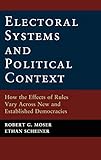Electoral systems and political context : How the effects of rules vary across new and established democracies
Publication details: Cambridge Cambridge University Press 2012Description: 284p xxiISBN:- 9781107025424
- 324.600000 MOS
| Item type | Current library | Call number | Status | Date due | Barcode |
|---|---|---|---|---|---|
 BOOKs
BOOKs
|
National Law School | 324.6 MOS (Browse shelf(Opens below)) | Available | 30302 |
Table of contents
1. Introduction: why don't electoral rules have the same effects in all countries?;
2. When do the effects of electoral systems diverge from our expectations?;
3. Mixed-member electoral systems: how they work and how they work for scholars;
4. How democratic experience and party system development condition the effects of electoral rules on disproportionality and the number of parties: theory, measurement, and expectations;
5. How democratic experience and party system development condition the effects of electoral rules on disproportionality and the number of parties: what we actually see;
6. Political context, electoral rules, and their effects on strategic and personal voting;
7. How democratic experience and party system development condition the effect of electoral rules on strategic defection;
8. Social diversity, electoral rules, and the number of parties;
9. How political context shapes the effect of electoral rules on women's representation;
10. Conclusion: why and how political context matters for electoral system effects.

There are no comments on this title.